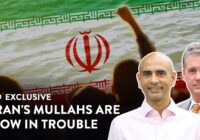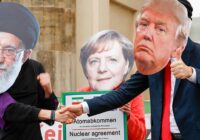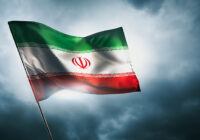Despite antagonistic identity politics, US-Iran relations have a history of pragmatic dialogue. This is the last of a two part series. Read part one here.
What is there to say about rapprochement being unable to reemerge in light of changing geopolitical paradigms and actors? Violence was inscribed into the identity politics of Iran and Iraq, not from any innate enmity, but with the geopolitical concerns of their leaders. The Ba’athist regime infamously othered the Iranians as “Pagan Zoroastrians” in the textbooks of Iraqi children, whilst the Shah rampantly favored propaganda based on the idea of an authentic Aryan-Iranian race.
And yet, personnel, institutions and ideational changes have occurred over time, transforming old relations so that a wholly unrecognizable Iraq under Nouri al-Maliki (despite its litany of failures) has succeeded in repairing relations with its larger neighbor.
Similarly, given the crusading zeal of neoconservative thought after 9/11, one can ascertain a shift in US policy, exemplified by the current acceptance of the need to negotiate with the Taliban. Thus, structural evolution occurs when moments for change are seized upon, and ingrained cultures of representation are challenged when interest and political will converge.
Seizing the Moment?
Admittedly, there stands a vast chasm between the United States and Iran on many issues; foremost among them being Syria. However, this is not set in stone, and changes occur subtly in the strategic preferences of states. These can only occur when these ephemeral moments are seized upon and furthered. Only by doing so can entrenched caricatures of the US and Iran be challenged; not an easy task given the depth of mistrust.
Yet, as Suzanne Maloney argues: “The Iranian case demonstrates that identity operates across a broad and ever evolving spectrum, which can endow foreign policy with texture and flexibility.” Structural interests undeniably govern the ebb and flow of foreign policy diktats.
The European nations currently protesting the US’ surveillance programs are aware of where their allegiance is due – the US or China. Ultimately, foreign policy practices never exist in a vacuum. Rather, they both influence and are influenced by changes in personnel and strategy.
Foreign Policy Paths: Rouhani and Obama
There is a sense in foreign policy circles that a shift in relations is possible. Reforming at home and abroad, Hassan Rouhani has signaled his firm desire for speedy diplomatic discussions with the US over the current nuclear impasse.
Echoing Mohammad Khatami’s philosophical style, the President Rouhani has made public his ambitious, yet potentially visionary international project for ending sanctions and the egalitarian call for universal nuclear disarmament.
Having held a plethora of top positions, including that of Iran’s top nuclear negotiator and a member of the Supreme National Security Council, Iran’s new president is viewed as a moderate and capable statesman both at home and abroad — something not lost on Washington. Subsequently, Rouhani’s victory has the potential to be the required moment of change, if his voice is listened to amongst the cacophony of hardliners surrounding the supreme leader.
This is not to suggest that Rouhani alone can affect change in Iranian-US relations. Ayatollah Khamenei has the final word on all leverage and shifts of power within the Iranian state. This is partly the result of the patronage networks and cultural capital that Khamenei has successfully held together, chiefly within the Assembly of Experts, the Armed Forces and the Revolutionary Guards.
Nevertheless, Rouhani is not without his own base of support, having held top positions before. Crucially, he has the ear of the supreme leader, and may be able to build bridges between Iran’s traditionally fragmented factions.
Moreover, on the US side, it would be naive to assume policy makers will disrupt policy preferences shaped over time. Barack Obama’s much hailed compromise with the Muslim world in 2009 has been followed by illegal drone strikes and mass international surveillance — a panopticon for the international sphere. Nevertheless, unexpected openings can come out of this moment that would be of benefit to both sides, as necessity can overcome the politics of antipathy.
The British parliament’s decision to withhold support for a strike on Syria has temporarily made Obama pause over the magnitude of the potential escalation. In the milieu of confusion, claim and counter claim over the use of chemical weapons, this provides a tentative window to prevent an escalation of conflict. Indeed, there has rarely been a time of greater need for Iranian-US collaboration, given the influence they both have on the ground.
Dialogue to Overcome the Nuclear Issue
On the wider issue of bilateral relations, policy makers must not spurn this opening if cooler heads are to prevail for potentially more pragmatic relations. Dialogue is needed to overcome the nuclear issue — now being used as a political screen by Israel and Saudi Arabia in their regional rivalry with Iran.
A massive issue, which has formed a pillar of Iranian state identity, Rouhani will realize that the crippling economic sanctions for Iranians means the days of reckless posturing are surely numbered.
Although one could make a strong argument that Iran has the same right to nuclear defense as other states, Rouhani has wisely departed from the fiery rhetoric of the Mahmoud Ahmadinejad years and has reframed discussions on shared interests and goals. Even Obama has largely distanced himself from his predecessor’s neoconservative zeal.
Iran and Pakistan have embarked on a new gas line project that has the potential to alleviate some of the massive damage done to the Iranian economy. Similarly, Central Asian economic integration in the form of the SCO (Shanghai Cooperation Organization) underlines the growing reality of non-western, multi-polarity to counter US influence in that region.
Yet, both projects face stubborn resistance from Saudi Arabia and the US. Israel and its supporters will also try to derail diplomatic talks. Binyamin Netanyahu continues to bark more desperately than ever, sidelined by the effectiveness of Iranian-US engagement. Rouhani will be fully aware of the need to return to the Khatami-era of pragmatism on the international stage, in order to rebuild the Iranian economy at home and provide jobs for its disaffected youth.
For the US, no long-term solution in the Syrian conflict (nor for that matter in Afghanistan) can be realistically envisioned without the considerable influence of Iran on the Assad regime. Moreover, the US also faces socioeconomic and political paralysis at home. It will need Iran’s cooperation for any chance of stability in the region.
For concerted diplomacy to work, the hawks in Washington preaching sanctions over dialogue need to be refuted. Only with this breathing space can hardliners on both sides be held back and moderates seize the opportunity to engage in dialogue.
Strengthening both public diplomatic and private negotiating channels has been attempted in the past. When Iran and the US previously collaborated at brief points in relations, consensus building was strengthened through intermediaries like Turkey and Brazil. If diplomacy is to avoid stumbling once again, other states’ involvement can draw actors down a route of diplomatic engagement that can further propel reason and dialogue.
Forgiving Sisyphus
Some will argue that these two states need "the other" which they have constructed over so long, in order to solidify their own identities. Is this a natural logic of state psyches in the brutal reality of global politics? It is very appealing to resign oneself to this. And yet, to do so is to ignore the powers at work, which make such images appear inevitable, logical and seamless to the shared cognitive machinations of decision makers.
It was in this way that in the media lens the Soviet Union and America went swiftly from friend to foe in the aftermath of the Second World War. To what extent can we — as citizens, academics, or activists — endeavor to change these representations, which appear to be the constant dissemination of counter images, histories and representations; a transnational solidarity wherein individuals speak the truth, oppose conflict and hold power to account?
There is only rigorous dialogue as a path forward, to prevent a regional cold war that is already being crudely dichotomized in terms of Shi'a and Sunni, pro- and anti-regime, East and West.
One thing is for certain: The Armageddon now being unleashed can only be resolved politically rather than militarily; and only when both the US and Iran cooperate and use their clout with global and internal players to bring hostilities to an end, will a move that can be potentially realized if direct diplomacy proves fruitful in the field of nuclear negotiations.
On the topics of Afghanistan and Salafi extremism, there is room for an alignment of interests. For nuclear negotiations to further progress, diplomatic styles will have to subtly give way for consensus building.
This has already begun to manifest itself in the concessions being made. Iran has valued its nuclear program as a symbol of national pride. Thus, Rouhani’s declaration of Iranian concessions, and the recent western consideration for flexibility for Iran to continue limited enrichment, must be viewed as encouraging consensus building steps, vital to end this age-long dispute — a small step in the longer road towards universal proliferation.
It is not out of the realm of possibility to see pragmatism restored in relations through a reimagining of political possibility. The other way is only enmity. Relations may thaw. The gods may yet forgive Sisyphus.
The views expressed in this article are the author's own and do not necessarily reflect Fair Observer’s editorial policy.
Image: Copyright © Shutterstock. All Rights Reserved
Support Fair Observer
We rely on your support for our independence, diversity and quality.
For more than 10 years, Fair Observer has been free, fair and independent. No billionaire owns us, no advertisers control us. We are a reader-supported nonprofit. Unlike many other publications, we keep our content free for readers regardless of where they live or whether they can afford to pay. We have no paywalls and no ads.
In the post-truth era of fake news, echo chambers and filter bubbles, we publish a plurality of perspectives from around the world. Anyone can publish with us, but everyone goes through a rigorous editorial process. So, you get fact-checked, well-reasoned content instead of noise.
We publish 3,000+ voices from 90+ countries. We also conduct education and training programs
on subjects ranging from digital media and journalism to writing and critical thinking. This
doesn’t come cheap. Servers, editors, trainers and web developers cost
money.
Please consider supporting us on a regular basis as a recurring donor or a
sustaining member.
Will you support FO’s journalism?
We rely on your support for our independence, diversity and quality.








Comment